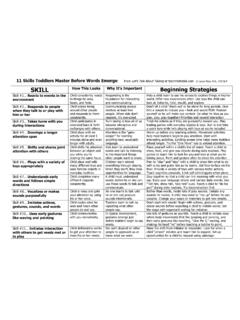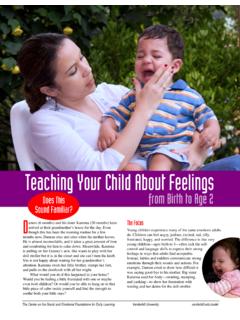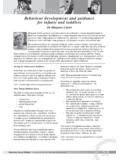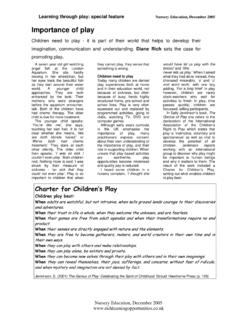Transcription of Laura Mize, M.S., CCC-SLP Pediatric Speech …
1 Laura Mize, , CCC-SLP . Pediatric Speech -Language Pathologist A Parent's Guide to Understanding Speech -Language Development in Toddlers Language development does not happen overnight. I'm going to give you an overview of how basic communication skills evolve so that you'll have a better understanding of this process and will be able to gauge how your child is doing. However, this material should not be a substitute for advice from a certified Speech - language pathologist who can work individually with you and your child. Laura Mize, , CCC-SLP . Table of Contents Introduction Chapter 1 Interacting Chapter 2 Understanding Chapter 3 Expressing Chapter 4 How a Child Sounds Conclusion Communication Milestones Chart Resources from INTRODUCTION. The process of developing language begins long before you hear a child's first word! Late Talking . Should I worry? No two children develop alike.. Don't compare your child to someone else's child.
2 For the most part, that's wise advice, but there is something important that you should know . There are patterns of communication skills that babies and toddlers acquire within broader age ranges. If skills are not emerging and developing within that time frame, we know that a toddler may have a Speech -language delay or disorder. What's the risk? When communication delays are left untreated in early childhood, research tells us that the risk increases exponentially for future academic and learning issues. Learning to use and understand language is essential for nearly every other kind of learning your child needs - not only as a toddler , but as he gets older and enters preschool and kindergarten. No one knows your own child like you do. You are the EXPERT! However, sometimes a parent can be so wrapped up in celebrating all of the things that are so wonderful about that child that they overlook areas where the child may be struggling.
3 That is why it is SO important, as we're talking about language development, for you to objectively look at your child and identify specific areas where he may need help. As we proceed through each of these areas of communication skill development, we'll also review a list of red flags which should indicate to you - in no uncertain terms - if there is a problem with your child's language development. Even if you do realize that there is an issue with the way your child is learning to communicate, the good news is . Parents play a key role in providing early intervention. This doesn't necessarily mean you'll see a professional right away. What it WILL. mean is that, as a parent, you can change what you're doing at home to help your child. Early intervention works! Communication Four Important Areas Early Speech -language skills unfold in a predictable pattern and include how a child learns to: INTERACT with others UNDERSTAND what words mean EXPRESS intentions with gestures or words PRODUCE Speech sounds others can understand A problem in any one of these areas can result in Speech -language delay or disorder.
4 Knowing what to pinpoint as the source of the problem determines how we work with a child and, ultimately, the progress he or she will make. To put it simply: If you're working on the wrong problem, you're likely to see little, slow, or no success. CHAPTER ONE. How A Child Interacts Social Interaction Building the Foundation All communication begins with interaction between two people. Until a child learns to: pay attention to people listen to what others say initiate contact with other people enjoy playing together and sharing experiences .he's not ready to understand and use words. Social skills are the foundation for language. Interacting is Connecting What We Want to See Seeking out and responding to other people is a skill we want to see develop in infancy. We want to see babies: enjoy watching other people particularly their faces. smile, laugh, and get excited when you talk to him by the time he's 6 months old. Even though they're busy by nature, toddlers with typically developing language skills are not difficult to engage.
5 Toddlers should: include you in their activities. show you things. try to direct your attention to look at them. look back and forth between you and a toy as you play together. smile at you with frequent and easy eye contact. If your child is doing these things, her social skills are developing nicely and not a factor in late talking. Red Flags with Interacting Skills Difficulty making and maintaining eye contact Doesn't use eye gaze to get your attention Seems to ignore other people Doesn't consistently respond to his name by 12 months Difficulty getting her attention when you talk to her Doesn't look to where you're pointing or when you say to her, Look! . Demonstrates better attention to objects, a DVD or TV. show, or an app or iPad than to people and conversations No back-and-forth sharing of sounds, smiles, or facial expressions Seems very independent and doesn't know how to ask for help when she needs something May not initiate or respond to cuddling If a child exhibits several red flags with interaction skills, the issue is likely more serious than late talking.
6 What You Can Do To Improve Interaction Get down on her level on the floor and really play together. Find things she likes to do with you and do them over and over. Encourage him to look at you and to share experiences with you. If he's playing with a toy or watching his favorite DVD, make sure you're included too! As you play together, you should also focus on helping him learn to copy or repeat what you do. Teach him to imitate you with toys or during little games that you know he's learning from you. Try "Patty Cake or Ring Around the Rosies.. Limit screen time. Research says toddlers who watch more than 2 hours a day with screens are at risk for delays. The worst thing you can do for a child who is struggling to learn language is to let her check out, do her own thing, or remain disconnected from others for much of the day. Sing! Play! Tickle! Run! Jump! Be silly! Have fun together! Did you notice my eyes in this picture? Make yourself interesting to look at so that a child will learn to include you as you play together.
7 A child must learn to love to stay with you and play with you before he can learn anything else from you! CHAPTER TWO. How A Child Understands Understanding Skills Cognition and Receptive Language During the first year a baby learns to understand how the world around him works. He learns about routines and when to expect things to happen in his day. She learns that objects don't disappear even though she can't see them (object permanence). and that she can make things happen (cause & effect). When a child becomes more skilled at moving his own body, he learns that he can get things and make things better for himself (simple problem solving). These kinds of milestones are cognitive or thinking and learning skills. A child's cognitive skills blossom into an amazing ability to understand what people are saying to him. Between 12 to 18. months, a child makes associations with words and begins to follow directions. This is referred to as receptive language or auditory comprehension.
8 Receptive language and cognition are important because until a child learns to understand words, she is not ready to use those words to communicate. A child must understand words BEFORE he begins to say words. When Learning is Difficult Diagnoses that Affect Cognition If your child was born with a condition that affected his or her brain development in any way during pregnancy, we know this can impact cognition, or how a child learns. This may include children with: genetic differences like Down syndrome, Fragile X or other genetic medical diagnoses neurological problems that cause motor delays or muscle tone differences such as cerebral palsy, hypotonia or hypertonia other issues due to complications during pregnancy or prematurity Sometimes this isn't explained clearly enough to parents. If you're in this situation, I want to be sure you understand that you should expect for your child to have some difficulties learning to understand words and then to talk.
9 There will also be children who have no known diagnosis at birth or as babies who also begin to show, even as early as twelve months old, that they are having difficulty learning to understand what words mean. Red Flags for Cognitive & Receptive Language Delays Not looking when you call their names by the first birthday Doesn't pick up on other people's facial expressions, tone of voice, and gestures by 12 months Doesn't follow simple directions by 18 months Doesn't look at and point to familiar people, objects, and body parts when asked Where's ____? by 18 months Doesn't point to familiar pictures in books by 24 months Repeats a question rather than answering it Answers a question incorrectly or off target Uses the same words and phrases without adding many new ones Most Speech is jargon or jabbering or using mostly unintelligible sentences after 2 (without the presence of a growing single word vocabulary). A child's ability to understand and respond to language is a factor which helps us determine if a child has a more significant developmental issue or is just a late talker.
10 If a child exhibits red flags with cognition or receptive language, the issue is more serious than late talking. What You Can Do To Improve Understanding Simplify what you say to your child. Speak in single words and short phrases. Talk about what she is paying attention to in the moment. Give him opportunities to demonstrate that he understands. Ask him to follow requests throughout the day such as, Show me the ____, and Where's the _____? If he's not pointing yet, encourage him to look around to find what you've asked him to locate. If a child does not seem to understand, show her what to do. If you've said, Give me your doll, and she doesn't move toward the doll, point to direct her attention. You may have to provide physical assistance to help a child learn to follow directions. As you begin to work at home with your child, it is more important for your child to understand what a word means than it is for him to say the word.






